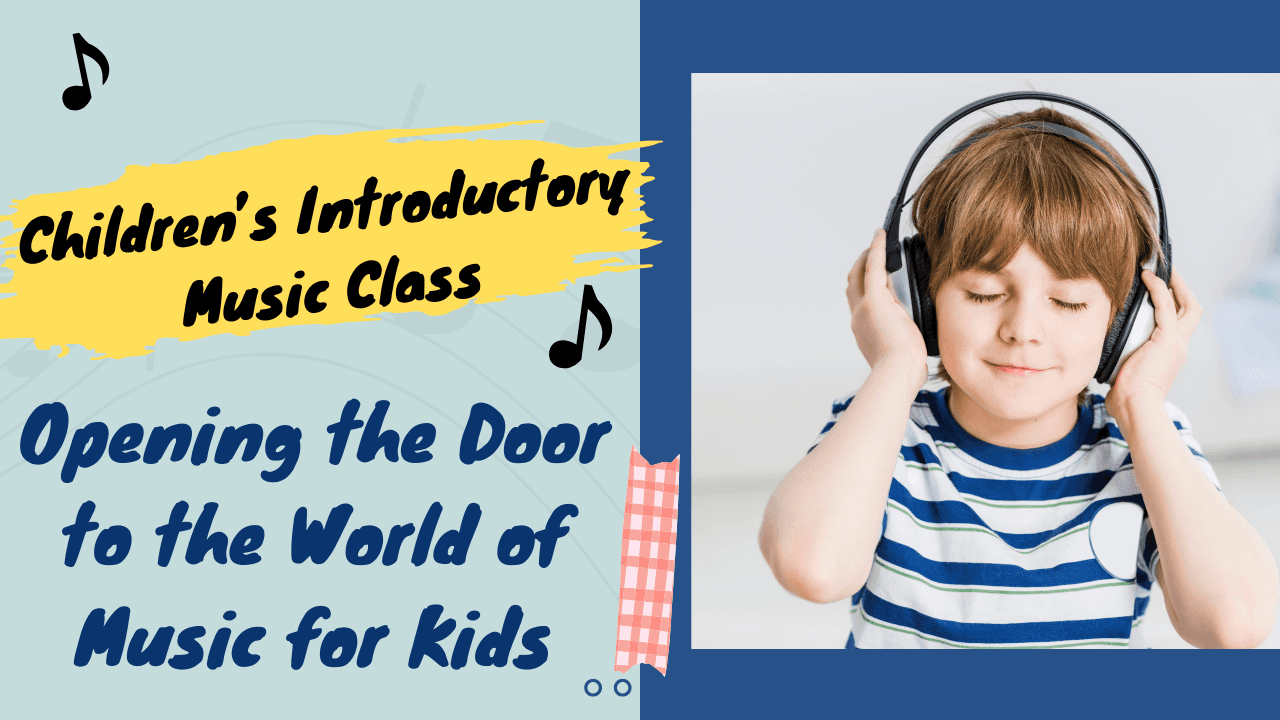Children’s Introductory Music Class
27 Oct 2024

Opening the Door to the World of Music for Kids
Music has a profound impact on children's growth, not only enhancing their artistic appreciation but also promoting the development of their intelligence, emotions, and social skills. More and more parents are realizing the importance of music education but are often confused about when to start learning, which instrument beginners should choose, and how to schedule lessons. This article will introduce several key questions regarding children’s introductory music lessons.
At what age can children start learning music?
In general, children can start formal music exposure between the ages of 3 to 5. At this age, kids are highly sensitive to sounds and rhythm, and they possess basic language and motor coordination skills, making it an ideal time to foster an interest in music and build fundamental skills. Preschool children can gradually build their musical cognition through singing, music games, and simple rhythm exercises.
Although 3 to 5 years old is a suitable starting point, it does not mean that music introduction must strictly follow this age range. The key is whether the child shows interest in music. Parents can choose the appropriate time to begin based on the child's displayed interest.
How long should the first lessons be?
For children just beginning to explore music, lesson time should not be too long. Typically, 20 to 30 minutes is an ideal duration. Younger children find it challenging to concentrate for extended periods, and overly long lessons may leave them feeling tired or losing interest. In contrast, shorter and engaging lessons can help children maintain their enthusiasm for music.
As children grow and adapt to music learning, the lesson length can gradually increase to 40 to 60 minutes, but this should still be adjusted according to the child's attention span and learning pace. Teachers and parents should focus on making the lessons lively and fun, using interaction and games to create an enjoyable learning atmosphere.
What instrument is suitable for beginners?
Choosing the right instrument is crucial to a child's music education. For children just starting with music, the following instruments are suitable:
Piano
The piano is one of the most popular beginner instruments for children. It not only helps children learn basic music theory but also develops their hand-eye coordination. With its broad range and intuitive keyboard, the piano is very suitable for children around 3 to 5 years old. Through the piano, children can clearly perceive changes in pitch, rhythm, and harmony, making it an ideal choice for music introduction.Violin
The violin is also an excellent instrument for beginners, especially for children interested in string instruments. Violins come in various sizes, so you can choose the appropriate size based on the child’s height. Learning the violin not only improves finger dexterity but also cultivates sensitivity to pitch. However, because playing the violin requires significant finger strength and control, it is generally recommended for children aged 5 and above.Recorder or Melodica
These simple wind instruments are particularly suitable for younger children. The recorder and melodica are easy to grasp and play, offering good practice for lung capacity and finger flexibility. Through these instruments, children can quickly experience changes in notes and melodies, making them excellent introductory instruments.Percussion Instruments
For younger children, percussion instruments like small drums, tambourines, or triangles are very fun and easy to play. These instruments help develop a sense of rhythm, and through direct striking and playing, children can immediately feel the musical beat, further inspiring their interest in music.
How to nurture children's interest in music?
In the early stages, parents and teachers should focus on fostering children’s interest, rather than excessively pursuing technical mastery. Through fun musical activities such as singing, dancing, and simple instrument playing, children can experience the joy of music while playing. It's important to respect the child's learning pace and avoid pressure or force, as this will help maintain their motivation for long-term learning.
Parents can also enhance children’s musical awareness by playing various types of music at home, taking them to concerts or performances, and creating more opportunities to engage with music.
Conclusion
Children’s music introduction is a process full of fun and exploration. With age-appropriate learning arrangements, suitable instrument choices, and proper guidance, children will gradually open the door to the world of music. No matter which instrument is chosen, the most important thing is for children to enjoy themselves in the world of music, stimulating their creativity and artistic imagination. As parents and teachers, our role is to provide a supportive and encouraging environment, allowing children to freely explore the beauty and endless possibilities of music.
为孩子打开音乐世界的大门
音乐对儿童的成长有着深远的影响,不仅能够提升他们的艺术修养,还能促进智力、情感和社交能力的发展。越来越多的家长意识到音乐教育的重要性,但也常常对什么时候开始学习、初学者应选择什么乐器、以及如何安排课程时间感到困惑。本文将为大家介绍关于儿童启蒙音乐课的几个重要问题。
几岁可以开始学习音乐?
一般而言,儿童可以从3至5岁开始正式接触音乐。这个年龄段的孩子对声音和节奏十分敏感,并且具备了基本的语言和动作协调能力,是培养音乐兴趣和基本技能的好时机。学龄前的孩子可以通过唱歌、音乐游戏、简单的节奏训练等方式,逐步建立对音乐的认知。
尽管3至5岁是一个合适的起点,但并不意味着音乐启蒙一定要严格遵循这一年龄界限。关键在于孩子是否对音乐表现出兴趣,家长可以根据孩子的表现选择适合的时机开始音乐学习。
一开始应该上多长时间的课?
对于刚刚接触音乐的孩子,课程时间不宜过长,通常20到30分钟是理想的时长。年幼的孩子注意力较难长时间集中,过长的课程可能会让他们感到疲倦或失去兴趣。相反,较短且充满趣味的课程可以帮助孩子保持对音乐的热情。
随着孩子的成长和对音乐学习的适应,课程时长可以逐渐增加到40到60分钟,但依然要根据孩子的注意力和学习节奏进行调整。老师和家长应注重通过互动、游戏等方式,使课程生动有趣,让孩子在愉快的氛围中进行学习。
入门适合选什么乐器?
选择合适的乐器对孩子的音乐学习至关重要。对于刚刚接触音乐的儿童,以下几种乐器较为合适:
钢琴
钢琴是最受欢迎的儿童入门乐器之一。它不仅能帮助孩子学习基本的乐理知识,还能培养他们的手眼协调能力。钢琴的音域广泛,键盘直观易懂,非常适合3至5岁左右的孩子学习。通过钢琴,孩子能够清楚地感知音高、节奏和和声的变化,是音乐启蒙的理想选择。
小提琴
小提琴也是一个非常适合初学者的乐器,尤其适合对弦乐器感兴趣的孩子。小提琴有多种尺寸,可以根据孩子的身高选择合适的型号。学习小提琴不仅能锻炼孩子的手指灵活性,还能培养他们对音准的敏感度。不过,由于小提琴的演奏对手指力量和控制要求较高,通常建议5岁以上的孩子开始学习。
竖笛或口风琴
这些简单的吹奏乐器特别适合年幼的孩子。竖笛和口风琴结构简单,容易上手,对儿童的肺活量和手指灵活性有良好的训练作用。通过这些乐器,孩子可以快速感受到音符和旋律的变化,是很好的启蒙乐器。
打击乐器
对于年龄较小的孩子来说,打击乐器如小鼓、铃鼓或三角铁是非常有趣且容易上手的选择。这些乐器能够帮助孩子培养节奏感,并且通过直接的敲击和演奏,孩子能够立刻感受到音乐的韵律,进一步激发他们对音乐的兴趣。
如何培养孩子的音乐兴趣?
在启蒙阶段,家长和老师应该把重点放在培养孩子的兴趣上,而不是过分追求技巧的掌握。通过各种趣味性强的音乐活动,如唱歌、舞蹈、简单的乐器演奏等,可以让孩子在玩耍中感受到音乐的快乐。同时,尊重孩子的学习节奏,不强迫或过度施压,才能让他们保持长久的学习动力。
家长还可以通过在家播放各种类型的音乐,带孩子参加音乐会或演奏会等方式,创造更多接触音乐的机会,进一步增强孩子的音乐感知能力。
总结
儿童的音乐启蒙是一个充满乐趣和探索的过程。通过适龄的学习安排、合适的乐器选择以及正确的引导,孩子们将会逐渐打开音乐世界的大门。无论选择哪种乐器,最重要的是让孩子在音乐的世界中享受乐趣,激发他们的创造力和艺术想象力。作为家长和老师,我们的任务是提供一个支持和鼓励的环境,让孩子自由探索音乐的美妙与无限可能。